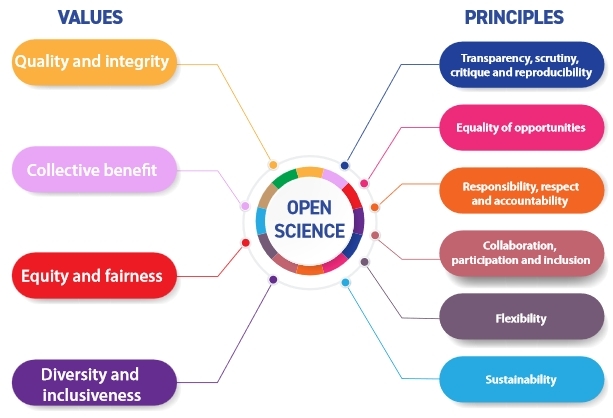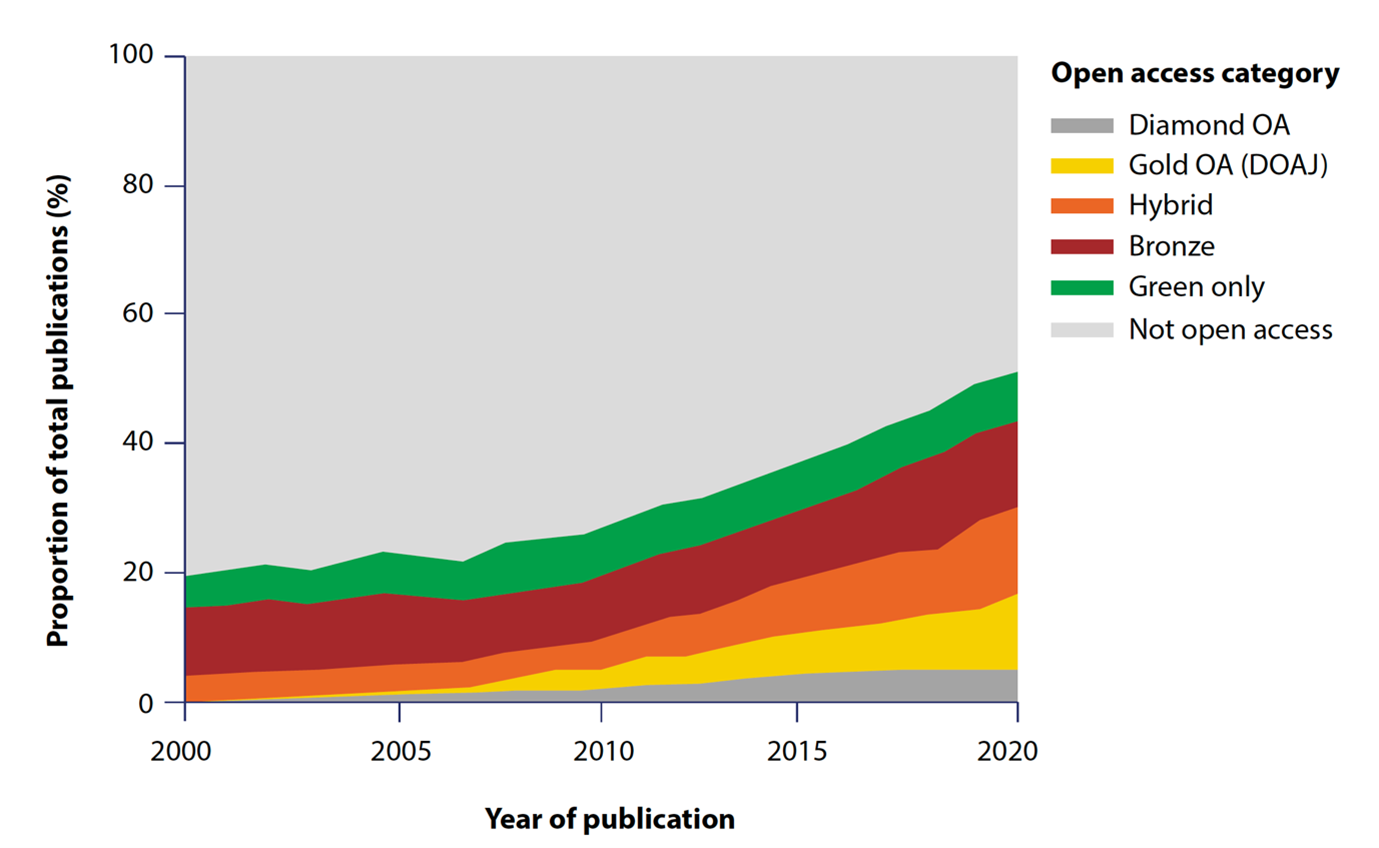The UNESCO Open Science Outlook: OS progresses, but unequally
Last December, UNESCO published the first global report on the trends of Open Science (OS). In this blog post, the main findings are highlighted: OS is increasing but does so unevenly and its monitoring is mainly focused on outputs, missing potential progress in participation and dialogue.
A value-led perspective on Open Science
In 2021, UNESCO approved its Recommendation on Open Science (OS). By signing this recommendation, 193 countries made a commitment to support the development of OS with a vision of science as a global public good.
According to this vision, science is only genuinely “open” when it embraces some core values and principles, as illustrated in Figure 1. These include transparency, reproducibility and integrity, as generally claimed in OS frameworks, but also equity, fairness, diversity and inclusiveness, and a commitment to contribute to collective benefits, which are less often invoked in OS policies.

Findings of the Outlook: more Open Science, but unevenly distributed
Two years after the signature of the OS Recommendation, the UNESCO OS Outlook is the first (pilot) global monitoring exercise on the progress of OS according to this value-led perspective.
(Note that the UNESCO OS Outlook will be introduced by Dr. Tiffany Straza in a CWTS webinar on 2nd February, 2024, 15:00-16.15 CET).
The good news is that there is a strong trend towards“open” (i.e. accessible) scientific outputs: the share of Open Access (OA) publications is quickly increasing; the Outlook shows evidence of more sharing of datasets, software and educational resources; and an increase in participatory approaches to science.
There are, however, two downsides to this growth. First, OS has progressed faster in rich countries and organisations. This is no surprise: the transition towards OS requires significant financial and human resources; therefore wealthy countries and organisations are in an advantageous position to adopt OS.
However, this inequality also reflects choices made regarding the types of OS to develop. For example, as shown in Figure 2, OA has mainly grown via the adoption of gold and hybrid OA models (with substantial costs for organisations), although diamond and green OA provide more affordable and more equitable alternatives. Given differences in resources and distinct publishing traditions, OA in Western countries has advanced via gold and hybrid models, whereas regions such as Eastern Europe and Latin America have kept a substantial share of diamond OA (as shown in Figure 3). In short, the expansion of gold and hybrid models of OA has led to territorial inequality in the visibility and prestige of publications.


The second gap found by the UNESCO OS Outlook is that monitoring efforts have mainly focused on scientific outputs (primarily in scientific publications, and secondly on datasets, software and hardware), but much less on OS processes, outcomes or values. This means that there are too few monitoring efforts on axes of open science such as the use of collective infrastructures, participatory activities or dialogues with other knowledge systems; and little empirical evidence on the alignment of OS progress with values and principles.
The dangers of this uneven monitoring (a focus on outputs but not on processes and values) is the so-called ‘streetlight effect’: that policy attention focuses on those activities that can be monitored, leaving behind the disciplines, practices, topics and territories which conduct open science in ways that are not visible to traditional scientific indicators. Such bias is particularly problematic because OS as dialogue and participation is key to help aligning research with societal problems and challenges.
Opening up the monitoring of Open Science: more activities, more voices
In summary, the UNESCO OS Outlook highlights that OS is making progress, but that this progress is uneven in two senses: it is concentrated in the rich organisations and countries, and it appears to be focused (according to current monitoring tools) more on the internal scientific outputs than on knowledge creation and exchange with societal stakeholders.
These findings deserve some reflection in relation to current OS policies.
In terms of monitoring, new frameworks are needed that are more comprehensive, more pluralistic and which include value considerations. In particular, we have proposed that approaches to assess OS should aim to address all aspects and values of OS: first, broadening out the battery of OS activities captured (from outputs/papers to processes/engagements); second, opening up the monitoring to consider the diversity of possible OS trajectories (which directions align with stated values? gold or green? FAIR or CARE datasets?); third contextualising the description of OS (e.g. high energy physics in Tokyo and applied agriculture in rural India require different types of OS).
In terms of inequalities, an explicit monitoring on inclusiveness and collective benefits is crucial, because science has historically excluded some social groups (e.g. women and non-Westerners), as argued by scholars such as Sandra Harding. Also, current research systems tend to produce, in relative terms, more benefits for the richer countries (e.g. in the field of health research) and for the richest societal sectors (e.g. Big Tech).
See this blog and this preprint for a more extensive discussion on the challenges of monitoring OS.
Header image: UNESCO
DOI: 10.59350/91td8-0bv95



0 Comments
Add a comment